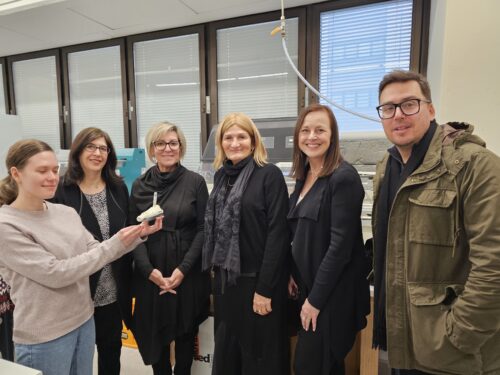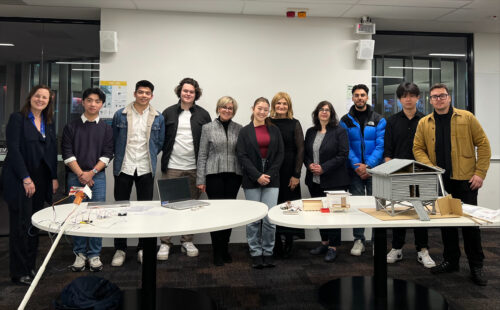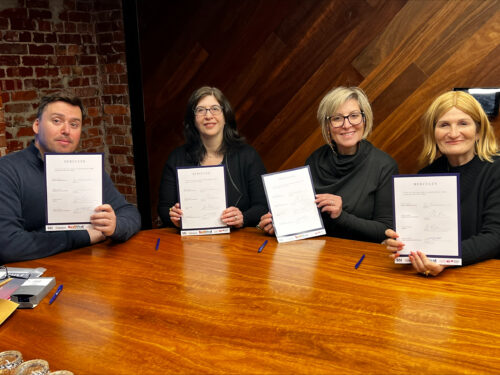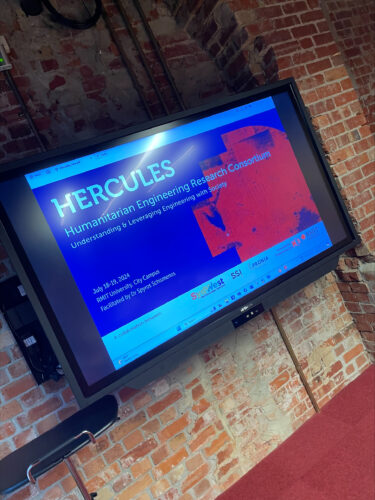Groundbreaking RMIT consortium puts community at the heart of engineering solutions

PRONIA, SydWest Multicultural Services and Settlement Services International establish an alliance with RMIT University to link students with diverse communities.
A first-of-its-kind community co-design consortium, launched on July 19, 2024, will give RMIT engineering students the opportunity to shift the dial on some of the big challenges facing culturally and linguistically diverse communities in Australia.
Working at the intersection of engineering practice and community-led collaboration, the RMIT Humanitarian Engineering Research Consortium: Understanding and Leveraging Engineering with Society, or HERCULES for short, ensures students learn the fundamentals of engineering by solving real-world challenges through genuine engagement with culturally and linguistically diverse communities via not-for-profit organisations.
Last week, first year mechanical engineering student, Tahlia Torasio presented four humanitarian-design prototype finalists to an audience of community leaders and RMIT University academics who comprise the first-of-its-kind community co-design consortium.
“My fellow humanitarian engineering students and I are motivated by the drive to move the needle on some of society’s most challenging problems, and being part of HERCULES will be a game changer for our education. Engaging with community via human service organisation to co-design solutions is a win-win for our understanding and community impact,” said Ms Torasio.
Dr. Spyros Schismenos, lecturer in Humanitarian Engineering is the co-leader of RMIT’s Humanitarian Engineering Lab who’s passionate about the advancement of innovative teaching and research at the intersection of human-centered design, technology, and experiential learning.
“By forging alliances with organisations working at the coalface of complex social and human challenges such as Sydney’s Sydwest Multicultural Services, Melbourne’s PRONIA and national Settlement Services International, we will ensure students design solutions with, not just for, people,” explained Schismenos
The students’ prototypes ranged from a sustainable pest-resistant bamboo house designed for extended family lifestyles, to a sun-tracking solar panel built to be accessed by multiple households. The prototypes were created by a winning team of 18 first-year students in response to community consultation and as part of the RMIT SydWest Engagement Challenge.
The RMIT SydWest Engagement Challenge attracts more than 1000 students enrolled in RMIT’s Introduction to Professional Engineering Practice and guides students on community engagement and co-design practice, giving students first-hand experience to understand and work with Australia’s culturally and linguistically diverse communities.
Quotes:
Violet Roumeliotis, CEO, Settlement Services International (SSI)
SSI CEO Violet Roumeliotis said the partnership demonstrates a shared commitment to empowering engineering students and supporting communities to co-design solutions to some of our most pressing challenges.
“Diverse communities face numerous challenges, often punctuated by inequality and lack of opportunity afforded to other sectors of society. SSI supports refugees, people seeking asylum, culturally and linguistically diverse communities, people living with disability, Aboriginal and Torres Straits Islander communities, women, youth, families and LGBTIQA+ communities.
By working with RMIT University and HERCULES consortium partners, we’ll provide a unique engagement experience that supports students in their educational pursuits and helps communities co-create place-based solutions,” she said.
Elfa Moraitakis, CEO, SydWest Multicultural Services
SydWest Multicultural Services CEO, Elfa Moraitakis said the impetus to join the HERCULES consortium grew from the students’ response to the RMIT SydWest Engagement Challenge where she saw first-hand the impact of collaboration that comes from genuine engagement.
“Working from a strength-based perspective enables individuals and communities to provide insights and solutions to the challenges impacting them. This approach enables students to develop these skills early in their career and to design engineering solutions with the end-user in mind.
“The Western Sydney region is a diverse and vibrant area with a mix of unique challenges and creative insights and perspectives providing students with a rich learning ground,” said Moraitakis.
Nikki Efremidis, Interim CEO, PRONIA
PRONIA Interim CEO, Nikki Efremidis is passionate about identifying interventions for some of Australia’s priority communities and co-creating solutions for pressing real-world social and humanitarian issues.
“It’s a wonderful initiative to bring like-minded community organisations together to build a consortium that will harness ideas and opportunities to help students to combine engineering practice with social engagement skills.
“The humanitarian engineering program, through Dr Schismenos, who also works with UNESCO, will bring a unique perspective to community collaboration and co-design on topics that put community at the heart of innovation,” said Efremidis



For more information regarding HERCULES consortium contact Dr Spyros Schismenos (spyros.schismenos@rmit.edu.au) and for information on RMIT University Humanitarian Engineering course visit https://www.rmit.edu.au/about/schools-colleges/engineering/news/humanitarian-engineering
For media enquiries please contact
Hannah Gartrell, SSI Head of Executive Communications and Media
0423 965 956 | hgartrell@ssi.org.au
Cindy Sciberras, SydWest Communications and Marketing Manager
02 9621 6633 |cindy.sciberras@sydwestms.org.au
John Lioupas, PRONIA Business Manager
04 00572 2911 | johnl@pronia.com.au
RMIT News
+61 439 704 077 | news@rmit.edu.au
